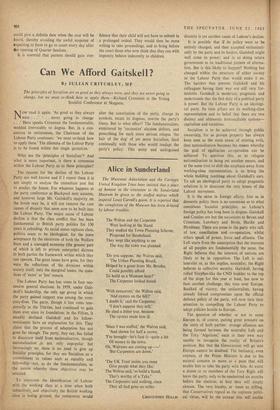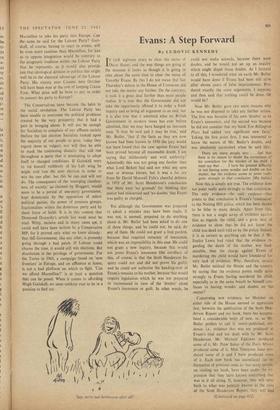Can We Afford Gaitskell?
By JULIAN CRITCHLEY, MP The principles of Socialism are as good as they always were, and they are never going to change, but we must re-think how to apply them.—Richard Crossman at the Young Socialist Conference at Skegness.
Now read it again. 'As good as they always were . . .". . . never going to change . . .' Here speaks Crossman the fundamentalist, wedded irrevocably to dogma. But, in a con- cession to revisionism, the Chairman of the Labour Party continues: 'we must re-think how to apply them.' The dilemma of the Labour Party is to be found within this single quotation.
What are the 'principles of Socialism'? And what is more important, is there a consensus within the Labour Party as to these principles?
The reasons for the decline of the Labour Party are well known and if I repeat them it is not simply to analyse the immediate past but to predict the future. For whatever happens at the party conference at Blackpool next autumn, and however large Mr. Gaitskell's majority on the bomb may be, it will not remove the root causes of disunity that seem now to be built into the Labour Party. The major cause of Labour decline is that the class conflict that has been fundamental to British party politics for 150 years is subsiding. As social status replaces class, politics cease to be ideological; for the mere acceptance by the electorate of both the Welfare State and a managed economy (the greater part of which is left to private enterprise) dictates to both parties the framework within which they can operate. The great issues have gone, for they were the reflections of the divisions within society itself; only the marginal issues, the ques- tions of 'more' or 'less' remain.
The Labour Party has lost votes in four suc- cessive general elections. In 1959, under Gait- skell's leadership, the only age group in which the party gained support was among the over- sixty-fives. The party, though it lost votes tem- porarily in the Thirties, had continued to gain them ever since its foundation; in the Fifties, it steadily declined. Gaitskell and his fellow- revisionists have an explanation for this. They claim that the process of adaptation has not gone far enough. The party, they say, has failed to dissociate itself from nationalisation, though nationalisation is not only unpopular but increasingly so; there is no need to give up Socialist principles, for they see Socialism as a commitment to values such as equality and fellowship—not, as do the fundamentalists, as the means whereby these objectives may be attained.
To overcome the identification of Labour with the working class at a time when both subjectively., and objectively the British working class is losing ground, the revisionists would alter the constitution of the party, change its symbols, recast its dogmas, rewrite the party's litany. But to what effect? The fundamentalists, embittered by 'successive' election defeats, and prescribing for each more serious relapse 'the hair of the dog' of yet more Socialism, feud continually with those who would readapt the party's policy. This noisy and undisguised disunity is yet another cause of Labour's decline.
It is possible that if its policy were to be entirely changed, and then accepted enthusiasti- cally by the party and its leaders, Gaitskell might well come to power; and in so doing return government to its traditional pattern of alterna- tion. But is this likely to happen? Nothing has changed within the structure of either society or the Labour Party that would make it so. The barriers that prevent Gaitskell and his colleagues having their way are still very for- midable. Gaitskell is moderate, pragmatic and understands that the first duty of a political party is power. But the Labour Party is an ideologi- cal party. Its twin pillars are its working-class representation and its belief that there are two distinct and ultimately irreconcilable systems— capitalism and socialism.
Socialism is to be achieved through public ownership, for as private property has always been seen as the main cause of existing evils, thus nationalisation becomes the means whereby the goal of egalitarian co-operation can be achieved. To question this, or to relegate nationalisation to being yet another means, and at the same time to shift the emphasis away from working-class representation, is to bring the whole building tumbling about Gaitskell's ears. To ask an ideological party to adopt pragmatic solutions is to desecrate the very bones of the Labour movement.
It is the same in foreign affairs. Just as in domestic policy there is no consensus as to what constitutes Socialist principles, so Labour's foreign policy has long been in dispute. Gaitskell and Cousins are but the successors to Bevan and Crossman, Lansbury and Bevin, Hardie and Hyndman. There are some in the party who talk of law, conciliation and co-operation, whilst others speak of power, force and alliance. The Left starts from the assumption that the interests of all peoples are fundamentally the same, the Right believes that the interests of nations are likely to be in opposition. The Left is uni- lateralist or, as this implies, neutralist; the Right believes in collective security. Gaitskell, having rolled Sisyphus-like the CND boulder to the top of the slope for this year at least, has now to face another challenge, this time over Europe. Baulked of victory, the unilateralists, having already forced compromises upon the official defence policy of the party, will now turn their attention to compelling the Labour Party to adopt policies hostile to Europe.
The question of whether or not to enter Europe is, of course, putting great pressure on the unity of both parties: strange alliances are being formed between the neutralist Left and the Tory 'Algerians,' each in their own way unable to recognise the reality of Britain's position. But that the Government will go into Europe cannot be doubted. The hesitancy, even coyness, of the Prime Minister is due to his natural concern to move at a pace that will enable him to take his party with him. At worst a dozen or so members of the Tory Right will leave the party, only to be readmitted six months before the election; at best they will simply abstain. The very loyalty, at times so stifling, that Conservatives regard as the supreme politi- cal virtue, will be the cement that will enable
Macmillan to take his party into Europe. Can the same be said for the Labour Party? Gait- skell, of course, having to react to events, will be even more cautious than Macmillan, for just as to oppose integration would be contrary to the pragmatic tradition within the Labour Party that he represents. so it would also provide just that ideological division in politics that might well be to the electoral advantage of the Labour Party. His victory over Cousins next October will have been won at the cost of keeping Clause Four. What price will he have to pay in order to commit his party to Europe?
The Conservatives have become the heirs to the social revolution. The Labour Party has been unable to overcome the political problems created by the very prosperity that it had a part in bringing about. It will not be enough for Socialists to complain of our affluent society (before the last election Socialists looked upon the majority of our people as poor, today they regard them as vulgar), nor will they be able to mask the continuing disunity that will run throughout a party that is attempting to adapt itself to changed conditions. If Gaitskell were to rid himself ruthlessly of his Left wing he might well lose the next election in order to win the one after, but this he. can and will not do. The consequence of the 'emerging classless- ness of society.' as claimed by Hoggart, would seem to be a period of one-party government, kept democratic by the opposition of minor political parties. the power of pressure groups, fractionalism within the dominant party and by sheer force of habit. It is in this context that Desmond Donnelly's article last week must be read. Witty, incisive and in many cases apt, it could well have been written by ,a Conservative MP, for it proved only what we knew already: that this Government, like any other, is presently going through a bad patch. If Labour could choose the time, it would still win elections. But dissolution is the privilege of government. For the Tories in 1963, a campaign based on 'new frontiers' in Europe, and on affluence at home, is not a bad platform on which to fight. 'Can we afford Macmillan?' is at least a question that can be posed. When it comes to affording Hugh Gaitskell, we seem unlikely ever to be in a position to find out.
'Say, we're not herbivores after all!'



































 Previous page
Previous page